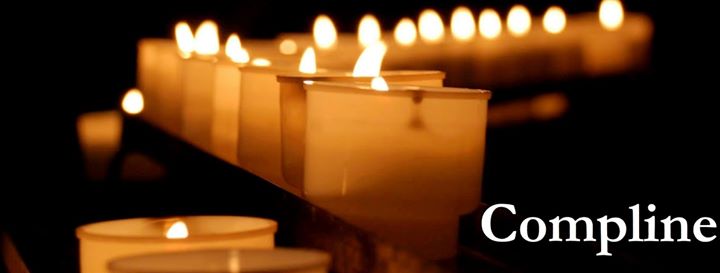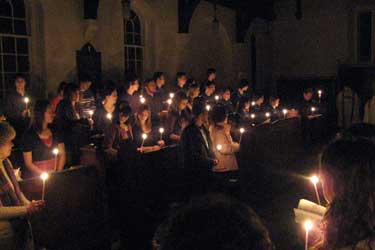If you missed the first post in the “Good for the Soul” series, check it out here.
Beauty. It’s a word that we often associate with descriptions of people, objects or even to talk about our relationship with nature.
But more than this, beauty is often beyond words or a qualitative object. Beauty can be something that we experience or hear. And after we recognize it, often the only way we know how to talk of the experience is to say, "That was so beautiful!"
On Sunday night, I found myself overwhelmed by beauty. It was an encounter I didn't plan to attend but just happened. Some friends invited me to a compline service at Christ Church in Rochester, NY (while I was in the city for another event). 
If you aren't familiar (I wasn't), a compline is a nightfall service that celebrates the end of the working day. The English word compline is derived from the Latin completorium, as compline is the completion of the working day. It's ancient tradition most likely begun around the time of St. Benedict in the 4th century that was celebrated by monks. But it's a tradition that remains today mostly in Anglican communities but sometimes found in Catholic or Eastern Orthodox churches. Most of all, it's a service which draws upon several sensory experiences of darkness, light, quiet, sacred space, vocalists and instruments.
When I walked into Christ Church minutes before the 9 pm compline began, the room was dark only lit by candles at the ends of pews and on the altar. The church was packed with worshippers. The only seats left for us to take came on the front right pew. So with a great view of the altar, I quickly turned off my phone as stillness engulfed the room. These weekly worshippers knew to quiet their souls for what came next. I followed their lead.
Out of the stillness, a large pipe organ in the balcony began with a prelude—triumphant but mellow tune. Then, a group of no more than 30 vocalists and accompanist alike processed in through the side doors finding their place in front of music stands lit by candles. More moments of silence preceded their first words.
Then, over the course of the next thirty minutes the congregation heard chants based on Psalms in perfect harmony. Words sung about being “Blessed and kept through the whole night" followed a sung version of the Lord’s Prayer. Then during several sung pieces, the choir kept time by tapping one another with their right hand on the person’s beside them shoulder. But with the darkness all around, never did I focus my attention on a particular musician nor the people sitting beside me. Rather, I found myself closing my eyes and taking in the sounds. Sometimes my gaze went toward a particular candle. 
When the music ended, two altar assistants dressed in black robes processed to the front of the church. No one in the congregation moved. Then, candle by candle they extinguished each of the flames. We remained silent until the last bit of light on the altar was gone.
Though no one pastor said, "Go in peace" it was exactly how we left.
I later learned from one of the members of the choir that the compline is the most well-attended service all week.
The richness of this seemingly beloved service made me think again about the constant pressures of our modern lives—phones beeping, appointments every hour on the hour and 24-hour news everything. Our souls must be so tired.
But the beauty of this experience woke us all up.
We realized again that quiet is the best gift we can give our soul.
We were reminded that even in darkness there is light.
We saw signs of unity modeled for us by worship leaders.
Attending the compline modeled again for me that none of us is ever really alone. We belong to each other. We belong to God.
And if this isn’t beauty, I don’t know what is!
It was so good for my soul.
(Maybe this ancient tradition of worship is something your congregation—especially if it has access to trained musicians—is something that might bless your community. You can read more about it here).